- Home
- Tom Sharpe
The Gropes Page 4
The Gropes Read online
Page 4
He even forgave him the appalling din of the drums. They had, after all, driven Horace from the house early enough in the morning to avoid the rush hour and provided him with a perfectly legitimate excuse for coming home late in the evening with his morale reinforced by a couple of large Scotches at the Gibbet & Goose, the local pub. And now that he came to think of it, Mrs Wiley’s encounter with the Noise Abatement Officer and the threat of being prosecuted had been no bad thing either. It had lessened Vera’s sense of authority, as had the scandal of the ‘growing’ whatnot in the lavatory and Mrs Lumsden’s account of her experience there.
In short, Horace Wiley had come to appreciate Esmond’s destructive gifts, so far removed from his own cautious and fearful existence. His early revulsion at finding the lad who could, to all intents and purposes, be his double lurking about the place was replaced with a new warmth towards the boy, coupled with a deep admiration for his spirit.
And so it was that when these early signs of rebellion had dissipated themselves and a reformed Esmond instead began to model himself once again on his father, Mr Wiley’s new-found fondness entirely evaporated.
Being himself was bad enough, and indeed Horace had always found looking at his face in the bathroom mirror while shaving an especially dispiriting experience. But then to look up from his plate of porridge at breakfast and see a younger version of himself, a dreadful replica, seated across the table duplicating his own actions and even eating porridge in the same way and with the same sort of reluctance – Vera insisted that porridge was the healthiest food for his heart – did nothing for his state of mind.
Or, for that matter, for his health. Never good, Horace Wiley’s body now reacted to this mirror image of his youthful self, awash with burgeoning manhood, or manhood as burgeoning as one would expect from a burgeoning bank manager in Croydon, by plunging paradoxically into premature old age, as if to escape the torment of this unwanted recognition.
At forty-five, Horace Wiley looked sixty, and a year later had so much the appearance of a man of sixty-five that a visiting manager from the Lowland Bank’s head office went so far as to enquire what he intended to do the next year when he retired. That evening, Mr Wiley returned from the Gibbet & Goose with six double Scotches inside him instead of the usual two.
‘Of course I’m drunk,’ he told his wife with some difficulty when she accused him. ‘And you’d be drunk too if you could see yourself like I do.’
Mrs Wiley had been understandably furious.
‘Don’t you dare talk to me like that,’ she shouted. ‘You married me for better or for worse and it’s not my fault I am not as beautiful as I once was.’
‘True, very true,’ said Horace who found the statement peculiar. He had never found her beautiful so he couldn’t see why she should raise the issue now. Before he could puzzle this out and find a kitchen chair to slump into, she went on.
‘You should take a look at yourself,’ she snapped.
Horace peered at her and tried to focus. There appeared to be two of her.
‘I do. All the time,’ he muttered, making for the chair. ‘It’s unbearable. It’s awful. I can’t escape looking at myself. I’m … he’s always there. Always bloody there.’
It was his wife’s turn to peer. She wasn’t used to dealing with drunks and in any case she had never seen Horace more than mildly in his cups before. To have him come home in this awful condition only to insult her and then, slumped in a kitchen chair, to start talking about himself in the third person suggested more than mere drunkenness. Something more organic, perhaps even dementia, briefly crossed her mind before a whiff, in fact a veritable blast, of Scotch hit her as Horace struggled to his feet with an ashen face.
‘There it is again,’ he screamed staring wildly past her at the kitchen door. ‘And now there are two of me. And what are they doing in my pyjamas?’
Mrs Wiley glanced apprehensively over her shoulder. She had DTs on her mind now. Perhaps Horace had been a secret drinker and the stuff had finally caught up with him, sending him crazy. But it was only Esmond, lurking. Before she could point out this seemingly obvious fact Horace started again.
‘Out, damned spot! Out, I say!’ he yelled, the overdose of Scotch evidently combining with vivid memories of a school trip to the Old Vic. ‘One, two: why then, ’tis time to do it. Hell is murky!’
Grabbing a carving knife, Horace drunkenly advanced on his son, lunged at him and fell flat on his face.
‘What’s up with Dad?’ Esmond asked, as Vera knelt by Horace and removed the knife.
‘He’s not himself,’ she answered. ‘Or he seems to think someone else is him. Or something. Leave off lurking, Esmond, and help get your father sorted before I ring for an ambulance.’
Together they dragged Horace up the stairs and put him to bed, by which time Vera had decided not to call the doctor after all. Instead she phoned her brother Albert who said he’d come over in the morning.
‘But I need you now,’ Vera insisted. ‘Horace has just tried to stab Esmond. He’s out of his mind.’
Albert kept his thoughts about his brother-in-law’s mental condition to himself and put the phone down. He was over the alcohol limit himself and he had no intention of losing his licence for no better reason than that Horace Wiley had tried to do what any sane father would have done years ago.
Chapter 6
And so while Horace escaped from the torment of his family life in drunken sleep, his wife spent a sleepless night trying to come to terms with the knowledge that her husband was insane and that he would lose his job at the bank and end his days in a lunatic asylum which all the neighbours would know about. This combination of ghastly outcomes led her thoughts to an even more melodramatic conclusion: that Horace might actually succeed in murdering her darling son as soon as her back was turned. Vera Wiley determined never to leave them alone again, and so strong was her romantic imagination that she gained some comfort from the prospect of defending her darling Esmond even if this meant being stabbed to death herself by her demented husband in the process. Naturally, Horace would die with her – she would see to that – and Esmond would go through life suitably haunted by unrequited guilt (Vera wasn’t sure what ‘unrequited’ meant except that it had something to do with love and was somehow unavoidable) and the dread secret of the tragedy which he could never bring himself to tell anyone. Vera accompanied these theatrical thoughts with a series of sobs and finally towards dawn dozed fitfully while her husband snored.
In his bedroom, Esmond listened to these sounds and tried to understand what had happened, and why his father had called him a ‘damned spot’ and told him to get the hell out of the house. It was most peculiar and, to an impressionable youth, deeply disturbing. And his father’s intentions with regard to the use of the carving knife had been too obvious to be ignored.
Caught between an embarrassingly sentimental mother and a manifestly murderous father, or, at the very least, one who didn’t behave at all rationally, it was not surprising that Esmond felt the need to escape into a healthier and less confusing atmosphere in which he wouldn’t be accepted so uncritically by his mother and rejected so bitterly by his father. There were other worlds to conquer and the sooner he could find one that suited him the better. By the time he finally fell asleep Esmond, in his first act of rebellion since the ill-fated experiment with the drums, had made up his mind to run away from home. It was too bad. He shouldn’t have to put up with such treatment and even if he ended up living on the streets, poor and hungry and friendless, it had to be better than this.
But he was saved this desperate measure by his Uncle Albert who arrived the next morning in his Aston Martin after Esmond had left for school.
‘Now what’s all this about?’ he demanded in his usual loud voice as soon as he entered the house. Vera hurried him into the kitchen and shut the door.
‘It’s Horace. He came home drunk and started shouting at Esmond and then he grabbed a knife and tried to kill him. He said
the most horrible things about me too and how there were two of him and –’
‘Two what of him?’ Albert interrupted.
‘I don’t know. He wasn’t making any sense. He just said he was always looking at himself and he couldn’t stand it any more.’
Albert considered this prospect and thought he understood.
‘Can’t say I blame him. Dreadful-looking fellow. Comes of being a bank manager. I’ve never known one who wasn’t bloody sour. Can’t think why you married the bloke.’
‘Because he loved me passionately. He couldn’t live without me,’ said Vera, who had long since translated this fiction into fact. ‘We got engaged … he proposed to me on Beachy Head and –’
‘Yes, I know he did, don’t I just,’ said Albert, before he had to hear the story again. ‘What I want to know is what you expect me to do about him now he’s gone completely off his trolley. What does the doctor say?’
Vera sat down miserably at the kitchen table and shook her head.
‘I haven’t asked him. I mean, if I call the doctor he may say Horace is … well, not right in the head and he’d lose his job at the bank and then where would we be?’
‘Where’s Horace now?’
‘He’s upstairs in bed. I rang the bank and said he had a temperature and wouldn’t be in for a day or two. Oh, Albert, I don’t know what to do.’ She paused and looked at the drawer where the carving knife was. ‘I mean, next time I may not be around when he attacks Esmond.’
‘Has he ever attacked him before?’
Vera shook her head.
‘And what did Esmond say?’
‘He just asked what was wrong with his dad.’
‘You mean he hadn’t said anything to annoy Horace?’
‘He hadn’t said a word. He’d just come down in his pyjamas to find out why Horace was shouting and carrying on about there being two of himself. The poor boy didn’t get a chance to say anything before Horace grabbed the knife and hurled himself at him. It was horrible.’
‘Must’ve been,’ said Albert, who couldn’t for the life of him imagine his brother-in-law doing anything so impetuous any more than he could imagine Horace proposing passionately to Vera at the top of Beachy Head. Bloody hell, he must have been as tight as an owl to go for Esmond with Vera in the room. Even Albert would have thought twice before getting across his sister.
‘Still don’t see what I can do about it,’ he went on. ‘I mean to say … well, my advice is to keep him away from the bottle.’
‘You don’t imagine for a moment I let him drink in the house?’ said Vera indignantly. ‘Because I most certainly don’t. Only one glass of wine at Christmas but that’s different.’
Again Albert had to reassess his brother-in-law’s character.
‘You’re not telling me he gets tanked up in pubs? Horace in a pub? I don’t believe it. Bank managers don’t go anywhere near pubs. It’s against their religion.’
‘Well, he gets mad drunk somewhere, that I do know. He comes home smelling like a brewery. And he’s always late. He gets up at the crack of dawn and comes home so late I have to put his supper in the oven. Anyway, you go up and have a talk with him. I want to know what’s going on.’
Albert gave in. He might have been a formidable figure in the second-hand car trade in Essex but he’d never been able to stand up to his sister. He went upstairs and found Horace looking ghastly.
‘Hullo, hullo,’ he said loudly. ‘What’s all this I hear about you hitting the bottle and going for Esmond with a knife?’
Mr Wiley shrank down the bed. He couldn’t bear his brother-in-law at the best of times, and now was the worst. He had a fearful headache and the horrors of the night were still with him. To be questioned by a man he firmly believed to be a criminal and probably some sort of gangland leader was the last straw.
‘I don’t know what you’re talking about,’ he murmured weakly. ‘I haven’t been well.’
‘You don’t have to tell me, Horace, you don’t have to tell me,’ said Albert and opened the curtains with a jerk.
Mr Wiley cowered under the bedclothes and moaned but his brother-in-law wasn’t to be stopped. Albert was getting his own back for years of Horace’s moral superiority. He sat down heavily on the bed and pulled the bedclothes off the sick man’s face. In the bright sunlight Mr Wiley looked worse and felt worse still. Even Albert Ponson was shaken.
‘Blimey,’ he said. ‘You’ve got something a bloody sight worse than a hangover, mate. And I don’t mean maybe.’
‘I know I have.’
‘Know what it is?’ Albert asked, almost sympathetically. This was deathbed stuff.
‘Yes,’ said Horace. ‘I know all right.’
‘Not the pox, is it?’ Albert enquired. His mind ran along sordid lines.
‘The pox?’ said Horace whose mind didn’t.
‘Yeah, you know. The old tertiary. Syph or gonorrhoea.’
‘Certainly not,’ said Horace indignantly, momentarily startled out of his discomfort. ‘What the hell do you think I am?’
‘All right, all right. No need to get toffee-nosed about it. Only asking. Could happen to anyone.’
‘Well, it couldn’t happen to me,’ said Horace, and subsided onto the pillow only slightly mollified.
Albert Ponson’s next remark did him no good at all.
‘All I’m saying is you look like you ought to book in with a good undertaker. I’ve seen blokes look better when they’ve turned off the life-support machine.’
Horace stared at him venomously.
‘Thank you very much,’ he said. ‘You’re a great comfort, you are. Now, if you don’t mind, I’d be grateful if you’d go back downstairs and let me get some rest.’
But Albert wasn’t to be budged so easily.
‘Can’t do that,’ he said. ‘Vera wants to know what’s been going on, like. You’re getting up early and coming home late stinking of booze – you got a piece on the side or something?’
‘A piece? What do you mean by that?’
‘A bird, a lover. You know, a floozy.’
‘Well, you can go down and tell her I haven’t,’ said Horace. ‘It’s nothing like that.’
Albert looked at him doubtfully.
‘All right, I’ll believe you, though millions wouldn’t. It’s not the big C, is it?’
‘No, it isn’t. It isn’t anything physical. It’s much worse than that.’
He stopped. Albert Ponson wasn’t the sort of person he wanted to confide in. When it came to understanding the problems of having a son like Esmond lurking around the place and looking exactly like you and behaving exactly like you, then Albert would be no help at all. A man who went around giving drums to tone-deaf nephews had to be wholly lacking in sensibility.
On the other hand, Horace couldn’t bring himself to explain his feelings to Vera. Her combination of devotion to Esmond and horrible sentimentality, which Horace had come to recognise as another form of sadism, or at least violence, made his confession impossible. Anything might be better than the appalling scene that would result from even the hint that Horace couldn’t stand the sight of his son. Albert was sufficiently cowed by his sister to understand that. Horace came to a sudden decision.
‘It’s Esmond. That’s what’s the matter with me. He’s doing terrible things to my psyche.’
Albert Ponson tried to come to grips with the statement. Being in the pre-used car business he knew about psychology, but psyche was a new one to him.
‘You mean with those drums? Yeah, well, Vera told me about that and all, but –’
‘Not the drums,’ said Horace. ‘And not the piano practice either. It’s him …’ He sighed miserably. ‘You don’t have a family so you wouldn’t know.’
‘No, Belinda and me haven’t been blessed with kids,’ Albert said stiffly. It was evidently a sore point.
‘Blessed? Blessed? You don’t know how lucky you are.’
‘I wouldn’t put it like that myself. I mean, we’ve
been trying for years. Something has to be wrong with Belinda’s insides because it sure as hell isn’t me … Anyway, what’s wrong with Esmond? Seems a fine strapping lad to me.’
Horace momentarily forgot his hangover. It had never occurred to him that anyone could regard Esmond as a fine strapping anything, and that ‘lad’ was definitely suspicious.
‘You’re lying,’ he said. ‘Fine he isn’t, and strapping he’s certainly not. He’s the spitting image of me at his age and that’s not something I’d wish on my own worst enemy. I can’t stand him and never want to have to look at his pathetic face again.’
Albert Ponson stared at Horace and tried to come to terms with this extraordinary statement. He had never found his brother-in-law in the least likeable and hadn’t for a moment understood why Vera had married the fellow, but he shared his sister’s simple sentimentality and belief in the crudest of family values. In his world fathers were supposed to love their sons or at least be proud of them. It was the same with cats and dogs. You liked them because they were yours. To go around saying you detested your own son wasn’t just not nice – it was unnatural.
‘That’s not a nice thing to say, Horace,’ he said finally. ‘Not nice at all. Esmond’s your son. It’s only right and proper he looks like you. It would be bloody odd if he didn’t. I mean to say, if I had a son and he looked like someone else, I wouldn’t be too happy, me being away from home so often, know what I mean?’
Horace thought he did but he kept his thoughts to himself. He had begun to have a most remarkable idea. It required his brother-in-law’s cooperation, though it would have to be unwitting. He would have to act very carefully indeed. Horace Wiley fell back on his experience as a bank manager. For more years than he cared to remember he had lured customers who least required overdrafts into accepting them, while refusing loans to small businesses that desperately did need them.

 Blott on the Landscape
Blott on the Landscape Porterhouse Blue
Porterhouse Blue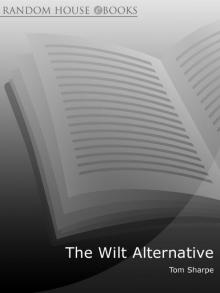 The Wilt Alternative:
The Wilt Alternative: The Great Pursuit
The Great Pursuit Ancestral Vices
Ancestral Vices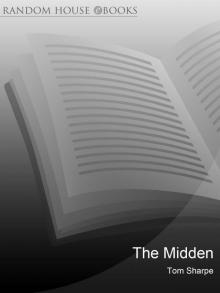 The Midden
The Midden Vintage Stuff
Vintage Stuff The Throwback
The Throwback Grantchester Grind:
Grantchester Grind: Wilt on High:
Wilt on High: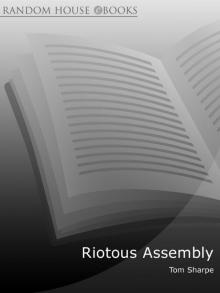 Riotous Assembly
Riotous Assembly Indecent Exposure
Indecent Exposure The Gropes
The Gropes Wilt in Nowhere:
Wilt in Nowhere: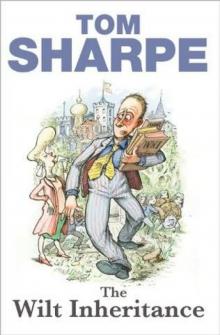 The Wilt Inheritance
The Wilt Inheritance Wilt:
Wilt: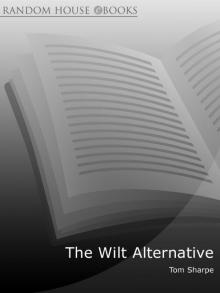 The Wilt Alternative
The Wilt Alternative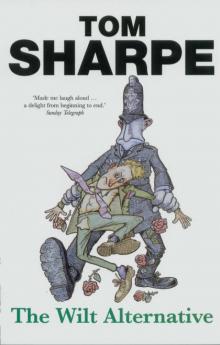 The Wilt Alternative w-2
The Wilt Alternative w-2 Grantchester Grind
Grantchester Grind Wilt on High
Wilt on High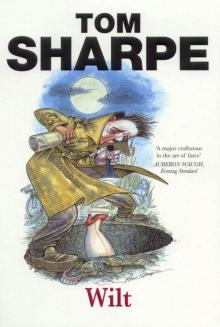 Wilt w-1
Wilt w-1 Wilt
Wilt The Wilt Inheritance (2010)
The Wilt Inheritance (2010) Wilt in Nowhere
Wilt in Nowhere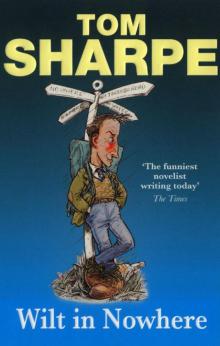 Wilt in Nowhere w-5
Wilt in Nowhere w-5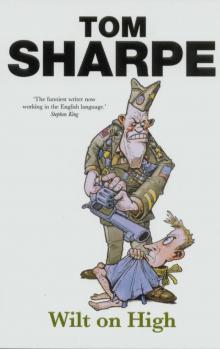 Wilt on High w-3
Wilt on High w-3